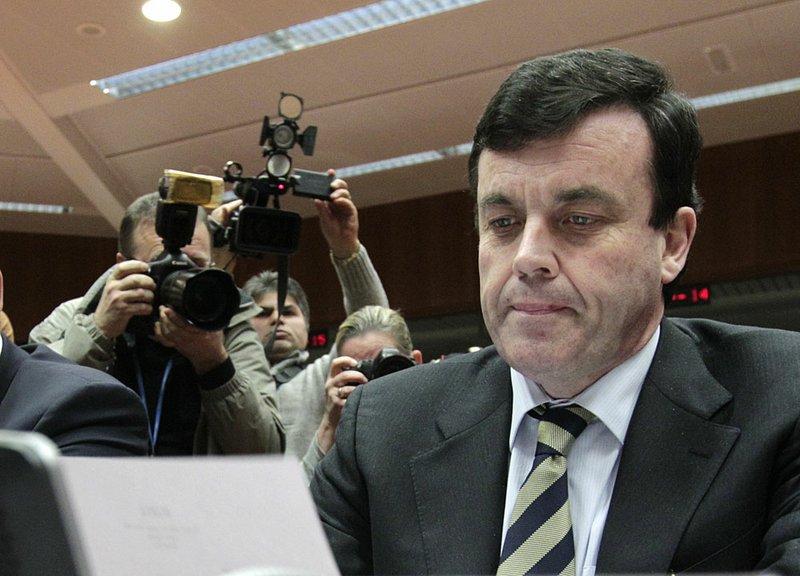BRUSSELS, Belgium — European Union nations agreed to give $89.4 billion in bailout loans to Ireland on Sunday to help the debt-stricken country weather its banking crisis, and sketched out new rules for future emergencies in an effort to restore faith in the euro currency.
The rescue deal, approved by finance ministers at an emergency meeting in Brussels, means two of the eurozone’s 16 nations have now come to depend on foreign help and underscores Europe’s struggle to contain its spreading debt crisis. The fear is that with Greece and now Ireland shored up, speculative traders will target the bloc’s other weak fiscal links, particularly Portugal.
In Dublin, Irish Prime Minister Brian Cowen said his country will take about $13 billion immediately to boost the capital reserves of its state-backed banks, whose bad loans were picked up by the Irish government but have become too much to handle. About $33 billion will remain in reserve, earmarked for the banks.
The rest of the loans will be used to cover Ireland’s deficits for the next four years. EU chiefs also gave Ireland an extra year, until 2015, to reduce its annual deficits to 3 percent of gross domestic product, the eurozone limit.
The deficit now stands at a modern European record of 32 percent because of the runaway costs of its bank bailout program.
Cowen said the accord - reached after two weeks of tense negotiations in Brussels and Dublin to fathom the true depth of the country’s cash crisis - “provides Ireland with vital time and space to successfully and conclusively address the unprecedented problems that we’ve been dealing with since this global economic crisis began.”
However, in a surprise accounting move, European and International Monetary Fund experts decided that Ireland first must run down its own cash stockpile and deploy its previously off-limits pension reserves in the bailout.
Until now Irish and EU law had made it illegal for Ireland to use its pension fund to cover current expenditures. This move means Ireland will contribute about $23 billion to its own salvation.
Cowen said interest rates on the loans, with terms ranging from three years to 71/2 years, would average 5.83 percent - higher than the 5.2 percent being paid by Greece for its own May bailout.
But the prime minister said at a nighttime press conference that Ireland had no choice, because international investors had decided that lending to Ireland was too risky and were demanding unreasonable returns. The yield on 10-year Irish bonds rose Friday to a euro-era high of 9.2 percent.
When asked whether Ireland could afford the repayments on its new EU-IMF debts, Cowen said Ireland couldn’t afford not to take this aid.
“If we didn’t have this program, we would have to go back to the markets, which as you know are at prohibitive rates,” Cowen said. “We would pay far more.”
As part of the deal, Ireland has been absolved from making further payments into the $150 billion bailout of Greece.
The three groups offering funds to Ireland - the 16-nation eurozone, the full 27-nation EU, and the global donors of the IMF - each have committed $29.8 billion. Extra bilateral loans from Sweden, Denmark and Britain are included within the EU contribution totals.
To shore up longer-term confidence in the euro, EU finance ministers also agreed on a permanent mechanism that from 2013 would allow a country to restructure its debts once it has been deemed insolvent.
Jean-Claude Juncker, the head of the Eurogroup, which includes the 16 euro nations, said private creditors would be forced to take losses only if ministers agreed unanimously that the country had run out of money.
He said that if a country is merely facing a crisis of liquidity, it would get financial help similar to the bailout agreed for Ireland.
Meanwhile, European officials also said Sunday that they are considering giving Greece more time to pay back its emergency loan package.
EU monetary affairs chief Olli Rehn said finance ministers have agreed “to look into” extending the deadline for Greece to repay its loans to 7 1/2 years from 3 years.
That would bring Greece’s loan package in line with one agreed Sunday for Ireland.
Rehn says “the commission has been advocating this alignment.”
Greece was bailed out by fellow eurozone nations and the IMF this spring after it was close to defaulting on its debt.
Information for this article was contributed by David Stringer of The Associated Press.
Front Section, Pages 5 on 11/29/2010
